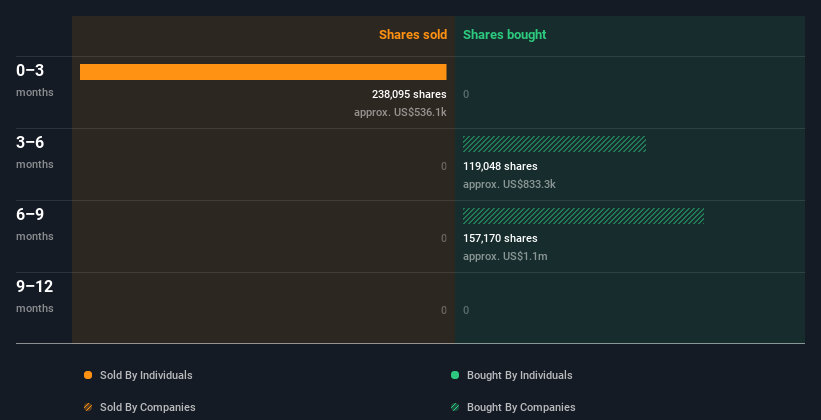- United States
- /
- Pharma
- /
- NasdaqCM:MIRA
Insiders Could Have Profited By Holding onto MIRA Pharmaceuticals Shares Despite 12% Drop

MIRA Pharmaceuticals, Inc.'s (NASDAQ:MIRA) value has fallen 12% in the last week, but insiders who sold US$726k worth of stock over the last year have had less success. Given that the average selling price of US$3.05 is still lower than the current share price, insiders would probably have been better off keeping their shares.
While insider transactions are not the most important thing when it comes to long-term investing, logic dictates you should pay some attention to whether insiders are buying or selling shares.
Check out our latest analysis for MIRA Pharmaceuticals
The Last 12 Months Of Insider Transactions At MIRA Pharmaceuticals
Over the last year, we can see that the biggest insider sale was by the insider, George Cappy, for US$313k worth of shares, at about US$5.07 per share. While insider selling is a negative, to us, it is more negative if the shares are sold at a lower price. It's of some comfort that this sale was conducted at a price well above the current share price, which is US$0.96. So it may not tell us anything about how insiders feel about the current share price.
Insiders in MIRA Pharmaceuticals didn't buy any shares in the last year. You can see a visual depiction of insider transactions (by companies and individuals) over the last 12 months, below. If you want to know exactly who sold, for how much, and when, simply click on the graph below!

If you are like me, then you will not want to miss this free list of growing companies that insiders are buying.
MIRA Pharmaceuticals Insiders Are Selling The Stock
The last three months saw significant insider selling at MIRA Pharmaceuticals. In total, insiders dumped US$726k worth of shares in that time, and we didn't record any purchases whatsoever. This may suggest that some insiders think that the shares are not cheap.
Insider Ownership Of MIRA Pharmaceuticals
Looking at the total insider shareholdings in a company can help to inform your view of whether they are well aligned with common shareholders. I reckon it's a good sign if insiders own a significant number of shares in the company. It appears that MIRA Pharmaceuticals insiders own 38% of the company, worth about US$5.5m. While this is a strong but not outstanding level of insider ownership, it's enough to indicate some alignment between management and smaller shareholders.
So What Do The MIRA Pharmaceuticals Insider Transactions Indicate?
Insiders sold MIRA Pharmaceuticals shares recently, but they didn't buy any. And there weren't any purchases to give us comfort, over the last year. While insiders do own shares, they don't own a heap, and they have been selling. We'd practice some caution before buying! While we like knowing what's going on with the insider's ownership and transactions, we make sure to also consider what risks are facing a stock before making any investment decision. Every company has risks, and we've spotted 6 warning signs for MIRA Pharmaceuticals (of which 3 are significant!) you should know about.
Of course, you might find a fantastic investment by looking elsewhere. So take a peek at this free list of interesting companies.
For the purposes of this article, insiders are those individuals who report their transactions to the relevant regulatory body. We currently account for open market transactions and private dispositions of direct interests only, but not derivative transactions or indirect interests.
New: Manage All Your Stock Portfolios in One Place
We've created the ultimate portfolio companion for stock investors, and it's free.
• Connect an unlimited number of Portfolios and see your total in one currency
• Be alerted to new Warning Signs or Risks via email or mobile
• Track the Fair Value of your stocks
Have feedback on this article? Concerned about the content? Get in touch with us directly. Alternatively, email editorial-team (at) simplywallst.com.
This article by Simply Wall St is general in nature. We provide commentary based on historical data and analyst forecasts only using an unbiased methodology and our articles are not intended to be financial advice. It does not constitute a recommendation to buy or sell any stock, and does not take account of your objectives, or your financial situation. We aim to bring you long-term focused analysis driven by fundamental data. Note that our analysis may not factor in the latest price-sensitive company announcements or qualitative material. Simply Wall St has no position in any stocks mentioned.
About NasdaqCM:MIRA
MIRA Pharmaceuticals
Operates as a pre-clinical-stage pharmaceutical development company with two neuroscience programs targeting a range of neurologic and neuropsychiatric disorders.
Flawless balance sheet slight.


